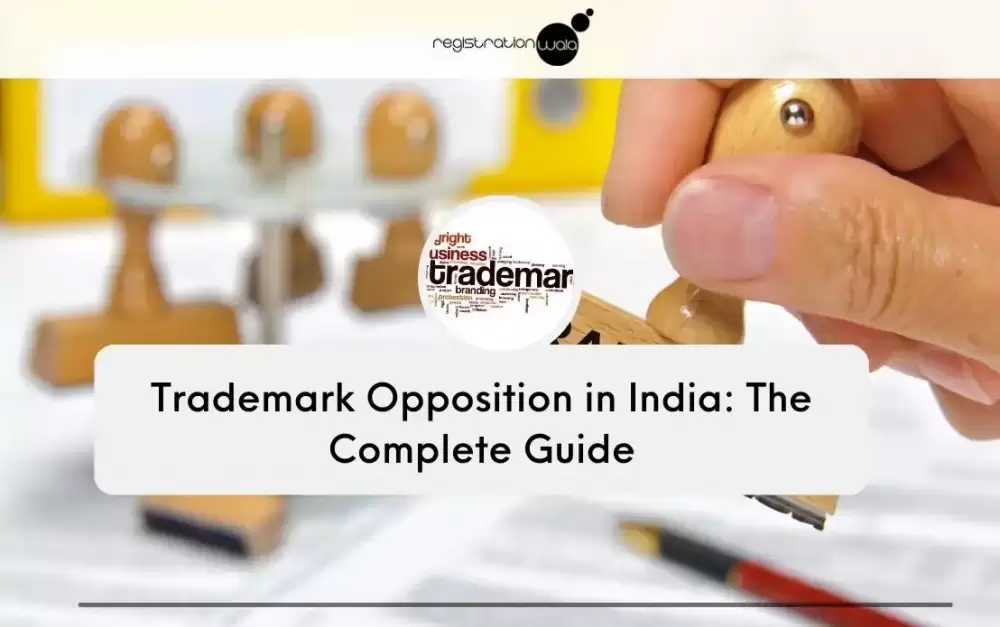Trademark Opposition in India: The Complete Guide
- August 06, 2022
- Registrationwala

- Home
- /
- Knowledge Base
- /
- IPR Services
- /
- Trademark Opposition
- /
- Trademark Opposition in India: The Complete Guide
Trademark Opposition in India: The Complete Guide
Trademark Opposition is an issue that can potentially destroy several brands and damage many businesses. But what is it, and how can you save yourself from it.
There is nothing more damaging to a brand name than trademark opposition.
Imagine that you are merrily going forward with your business with a brand name for which you have applied trademark registration. And one day, it happens. You receive a notice of trademark opposition – stating that you have violated some rules. What would you then do?
And most importantly, why has such a thing happened to you?
This blog will explore all the details that you must know about trademark opposition in India.
But first, let us start with the meaning of this term.
What is Trademark Opposition in India?
Your trademark lands in the trademark journal after the Registrar accepts your application. It stays there for four months, during which it is open to scrutiny from a third party. If that party thinks that your trademark contravenes any trademark right during this period of advertisement, you will receive a notice of trademark opposition.The endgame of your opponent is to stop you from registering your brand name.
What are the reasons for Trademark Opposition?
There are multiple reasons behind the opposition of a trademark. However, you can divide into two categories:
-
Absolute grounds
-
Relative grounds
Absolute Grounds
The absolute grounds of opposition are borne of explicit contravention of trademark rules. They consist of the following reasons:
-
Descriptiveness: Your brand name can face opposition if it falsely identifies with a geographical location from which it doesn’t belong.
-
Genericness: The brand name you choose should not contain generic terms.
-
Similarity: It is the most common cause of trademark opposition. In this case, your trademark is a direct copy of an existing brand.
-
Bad faith and fraud: The third party won’t shy away from filing an opposition notice if it feels you have applied for trademark registration in bad faith.
The absolute grounds for opposition emerge if your brand name is a direct copy of an existing trademark.
Relative Grounds
Relative grounds for trademark opposition come into the picture if someone opposes your brand name on a priority basis. The reasons are as follows:
-
If someone has opposed your mark on a priority-usage basis
-
Your trademark exists to harm the existing brand name.
-
If your trademark is similar to a business or domain name that already has the registration
-
Your trademark is similar to a well-known brand name regardless of whether the latter has a trademark registration certificate.
The relative grounds for opposition emerge when your brand name is deceptively similar to an existing mark.
What is the trademark opposition process?
The following are the series of events that happen during the procedure to oppose your brand name:
-
Notice of Opposition: Trademark opponent first files a notice of opposition to the Trademark Registrar. He can file the notice by himself or via a trademark attorney.
-
Counter statement filing: After receiving the notice, you – the trademark applicant – will file a counter statement within the next two months. If you fail, they will abandon your application.
-
Evidence Filing (Opponent): Your opponent will respond to your counter statement by submitting the evidence to support his case. He gets two months to accomplish this task. If he can’t file the evidence during this time, the Registrar may grant him an extra month to file the pieces of evidence.
-
Evidence filing (The applicant): Within two months of receiving the evidence from the opponent, you will need to file counter-evidence to support your claim to the trademark. If you cannot accomplish it during that time, the Registrar will give you an extra month to fulfill your task. If you don’t, your trademark application will be abandoned.
-
Analysis and hearing: After receiving shreds of evidence from both sides, the trademark registrar will conduct a hearing. Once it considers and hears the pleas of both parties, it makes the final decision.
Also Read : Trademark Opposition Proceeding in India
What documents do you need during this ordeal?
During the trademark opposition process in India, you will need to provide the following documents:
-
Trademark application form
-
Evidence to support your case
-
Details of your trademark attorney
And your opponent will require the following documents:
-
Trademark registration certificate (if he is the owner of the registered trademark)
-
Evidence to support the opposition
-
Details of their trademark attorney
Always keep the brand name insight when applying for trademark registration.
Always pay attention to those who oppose your attempt to register your brand name. If his opposition attempts succeed, you will lose more than only your brand name.
- 5028 views
